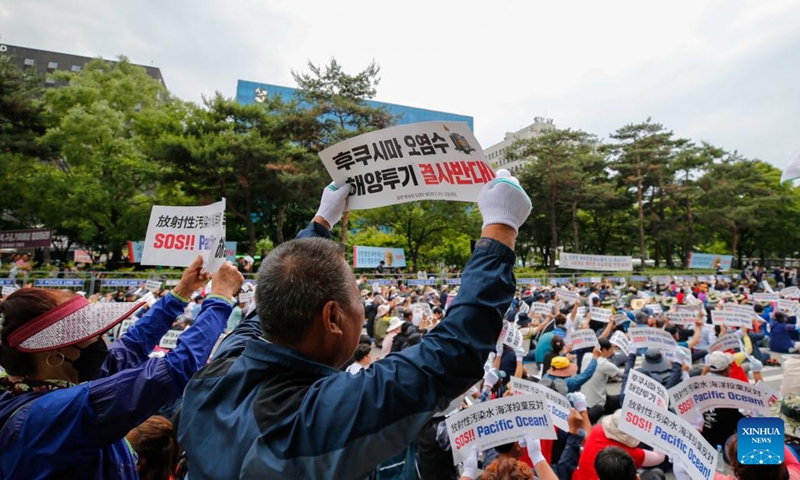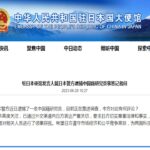The Chinese Foreign Ministry on Wednesday urged Tokyo to provide a convincing explanation and the IAEA secretariat to respond over the allegation after South Korean media reports revealed that the Japanese government has made a political donation to the International Atomic Energy Agency (IAEA) concerning the Fukushima nuclear-contaminated water disposal.
As Japan gets closer to releasing the Fukushima nuclear-contaminated water into the sea, South Korean media on June 21 revealed that the Japanese government has made a political donation of more than 1 million euros ($1.10 million) to the IAEA in order to resolve differences of opinion between the IAEA and third country experts conducting a review of the nuclear-contaminated water from the Fukushima Daiichi Nuclear Power Plant. According to the media reports, anonymous sources close to the matter said that the Japanese government had obtained the draft final assessment report from the IAEA’s Fukushima contaminated water disposal working group in advance and proposed substantive amendments, exerting undue influence on the final report conclusions.
Mao Ning, spokesperson for the Chinese Foreign Ministry, said at Wednesday’s press briefing that China has been closely following relevant media reports.
The Japanese government has the responsibility to provide a convincing explanation for the relevant media reports, and the IAEA secretariat should also respond to the matter, Mao stressed.
In fact, the media reports have intensified the international community’s concern over the dumping of the nuclear-contaminated water into the sea. People have reason to question whether the conclusion of the final assessment report of the IAEA technical working group is fair and objective, Mao stated.
China hopes that the IAEA secretariat will adhere to the principles of objectivity, professionalism and impartiality, fully respect and adopt the opinions of experts from all sides of the technical working group, come up with an assessment report that can stand the test of science and history, and not endorse Japan’s dumping plan, Mao said, noting that the international community will wait and see.
According to public data, the US has always been the largest contributor to the IAEA regular budget dues. Although China’s share of regular budget contributions to the IAEA has surpassed Japan since 2020 and becoming the second largest regular budget contributor, the share rate of the US and Japan, which support the dumping plan, is still overwhelming. Therefore, the two countries have a great voice in the IAEA.
Tokyo has taken advantage of the IAEA by approving it to send an expert team to Fukushima for reviewing the dumping of the contaminated wastewater in an attempt to get a permit, Jin Ying, a research fellow on Japan at the Chinese Academy of Social Sciences, told the Global Times on Wednesday.
The Japanese government has asked the IAEA to send the expert team to examine only Japan’s dumping plan, not all possible better disposal options for the contaminated wastewater. In fact, Japan is very cunningly exploiting a part of international law that has no coercive force, Jin said.
This is also a very irresponsible act for the Japanese government, which not only takes advantage of the IAEA, but also undermines the credibility of the IAEA in carrying out international cooperation in nuclear accident response and nuclear emergency response, the expert said.
As Japanese government is forcibly pushing forward the plan to dump the water, strong opposition from domestic groups, neighboring countries and international community has mounted.
On Wednesday, Japanese Nuclear Regulation Authority began the final inspection before the contaminated water is dumped, a day after the plant operator Tokyo Electric Power Company Holdings (TEPCO) had installed the last piece of equipment needed for the dumping, though an exact date has not been decided.
Last week, Japanese citizen groups launched a protest campaign “Fukushima action” in Fukushima Prefecture with hundreds of attendees to oppose the dumping plan, the Global Times learnt from Fukushima residents.
Yoshitaka Ikarashi, the Japanese representative of the Somei Platform – the Japan-China common market promotion association, and also a resident of Iwaki, Fukushima, told the Global Times on Wednesday that he made a public speech on June 22 at Meiji University to call on more people to oppose the dumping plan.
He pointed out that as Tokyo and TEPCO calculated well over the timing of paying additional compensation for mental damage to the residents precisely before dumping the contaminated water, it is getting difficult for those who received compensation to publicly voice their opposition against the dumping plan. It is similar to the Okinawa base issue, he said.
“This is why I stand out and made a speech in Meiji University,” Ikarashi said, calling for cooperation with China to gain more international public attention and continue to fight until successfully stopping the dumping plan.
“We need to ask whether we citizens need the short-term benefit or the environmental asset for future descendants,” the Fukushima resident stated.
(Global Times)




